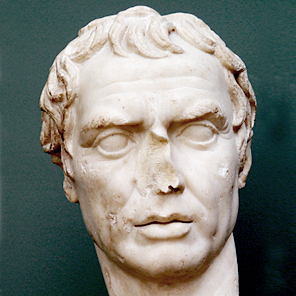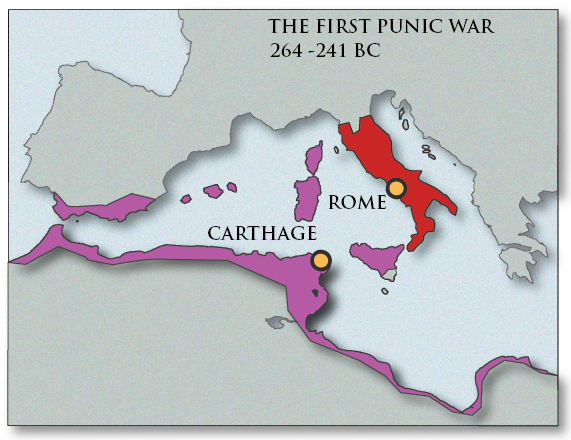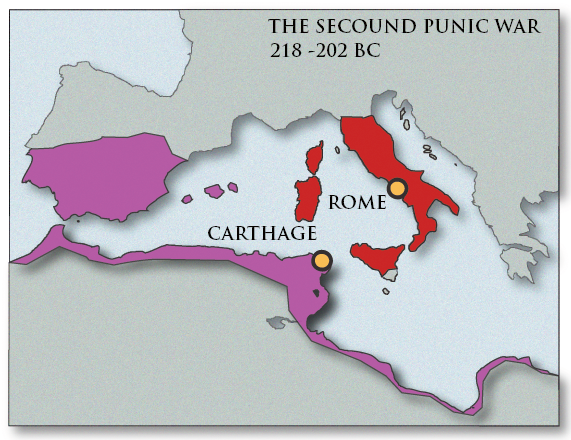The ROMAN CIVILIZATION
IMAGES OF THE ROMAN CIVILIZATION
THE ROMAN REPUBLIC
the Punic Wars & Expansion in the Mediterranean
ROME first began to make war outside the Italian peninsula in the Punic wars against Carthage.These wars, starting in 264 BC were probably the largest conflicts of the ancient world yet and saw Rome become the most powerful state of the Western Mediterranean, with territory in Sicily, North Africa, Iberia, and with the end of the Macedonian wars (which ran concurrently with the Punic wars) Greece as well. After the defeat of the Seleucid Emperor Antiochus III the Great in the Roman-Syrian War (Treaty of Apamea, 188 BC) in the eastern sea, Rome emerged as the dominant Mediterranean power and the most powerful city in the classical world
time line
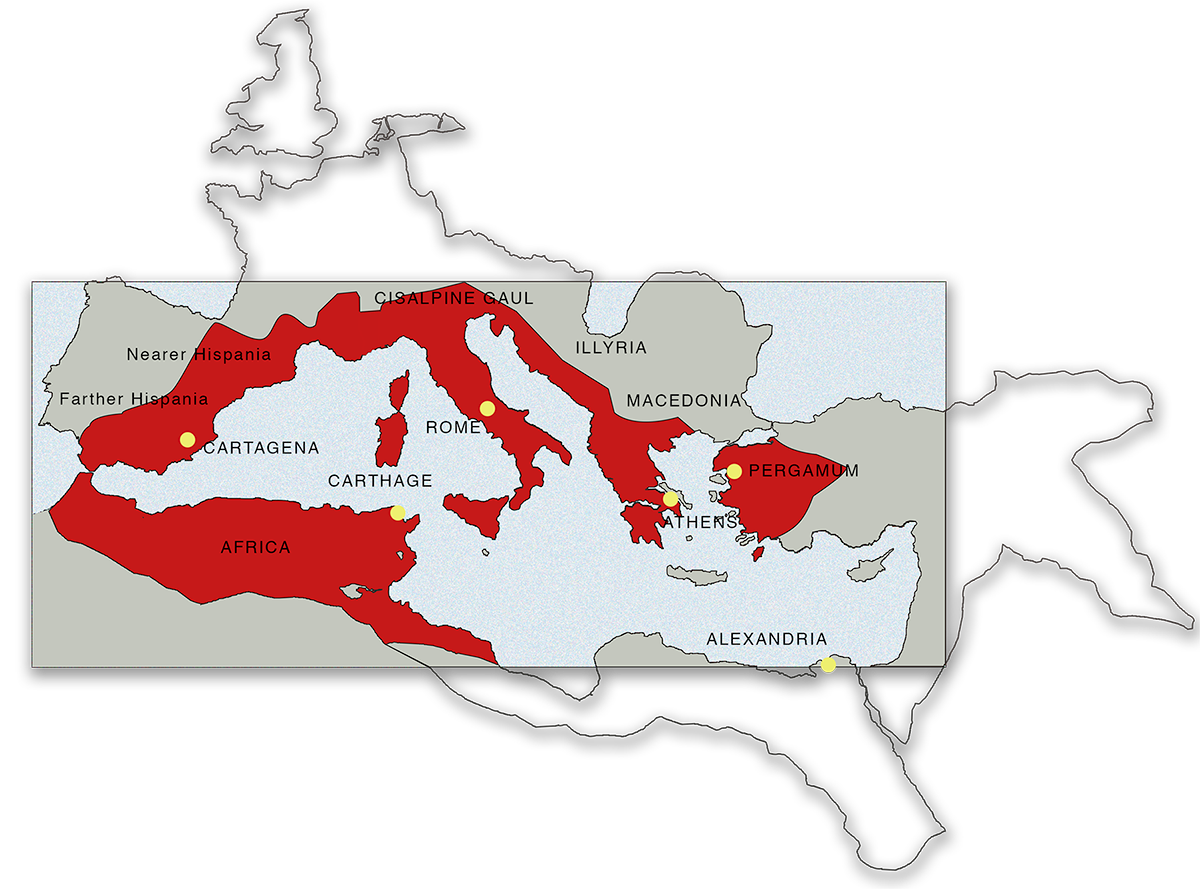
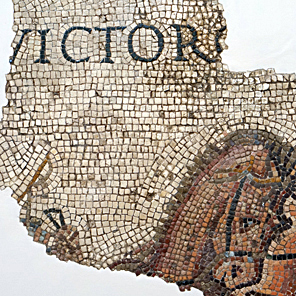
CONFLICTS OF THE REPUBLIC
Outbreak of the War 264 BC in Sicily The first conflict between Rome and Carthage, which is known as the first Punic1 war, began in Sicily; and really came to be a contest for the possession of that island.
CONQUEROR OF CARTHAGE
Scipio Africanus was a general in the Second Punic War and statesman of the Roman Republic. He was best known for defeating Hannibal at the final battle of the Second Punic War at Zama
The Roman–Seleucid War As a main result of the war the Roman Republic gained the hegemony over Greece and became the only remaining major power around the Mediterranean Sea.

FIRST PUNIC WAR 264 - 241
The First Punic War broke out in 264 BC; it was concentrated entirely on the island of Sicily. Rome beseiged many of the Carthaginian cities on Sicily, and when Carthage attempted to raise the seige with its navy, the Romans utterly destroyed that navy. For the first time since the rise of the Carthaginian empire, they had lost power over the sea-ways.
The war ended with no particular side winning over the other. In 241 BC, the Carthaginians and Romans signed a treaty in which Carthage had to give up Sicily, which it didn't miss, and to pay an indemnity to cover Roman costs for the war, which it could well afford. But Carthage soon faced rebellion among its mercenary troops and Rome, in 238 BC, took advantage of the confusion by seizing the island of Corsica. The Romans greatly feared the Carthaginians and wanted build as large a buffer zone as possible between them and the Carthaginians. By gaining Sicily, the Romans had expelled the Carthaginians from their back yard; they now wanted them out of their front yard, that is, the islands of Corsica and Sardinia west of the Italian peninsula.
The Carthaginians were furious at this action; even Roman historians believed it was a rash and unethical act. The Carthaginians began to shore up their presence in Europe. They sent first the general Hamilcar and then his son-in-law, Hasdrubal, to Spain to build colonies and an army. Both Hamilcar and Hasdrubal made allies among the native Iberians, and their armies, recruited from Iberians, grew ominous as Carthaginian power and influence crept up the Iberian peninsula
Following its defeat in the First Punic War, Carthage rebuilt its strength by expanding its empire in Spain. Growing increasingly anxious, the Romans had imposed a treaty on Carthage not to expand their empire past the Ebro river in Spain. However, when a small city in Spain, Saguntum, approached Rome asking for Roman friendship and alliance, the Romans couldn't resist having a friendly ally right in the heart of the Carthaginian Iberian empire.
A few years later, however, in 221 BC, a young man, only twenty-five years old, assumed command over Carthaginian Spain: Hannibal. At first, Hannibal gave the Saguntines wide berth for he wished to avoid coming into conflict with Rome. But the Saguntines were flush with confidence in their new alliance and began playing politics with other Spanish cities. Hannibal, despite direct threats from Rome, attacked Saguntum and conquered it.
The Romans attempted to solve the problem with diplomacy and demand that Carthage dismiss Hannibal and send him to Rome. When Carthage refused, the second Punic War began in 218 BC. Rome, however, was facing a formidable opponent; in the years following the first Punic War, Carthage had created a powerful empire in Spain with a terrifyingly large army. Hannibal marched that terrible army out of Spain and across Europe and, in September of 218, he crossed the Alps with his army and entered Italy on a war of invasion. Although his army was tired from the journey, he literally smashed the Roman armies he encountered in northern Italy. Within two months, he had conquered the whole of northern Italy, with the exception of two cities. These spectacular victories brought a horde of Gauls from the north to help him, fifty thousand or more; his victory over Rome, as he saw it, would be guaranteed if he could convince Roman allies and subject cities to join Carthage.
The Romans were divided as to whether they could beat Hannibal in open warfare and they knew that he and his army were alone and far from any supplies. Despite Hannibal's certainty that Roman allies would join him, the allies remained faithful to Rome. So on the eve of his invasion of Rome, Hannibal steered south. The Romans, desperate because of their losses, asked Quintus Fabius Maximus to become absolute dictator of Rome. Fabius determined to avoid open warfare at any cost and simply shadowed and harassed the Carthaginian army until they were weak enough to be engaged with openly. His instinct was to wait out Hannibal; he was hated for this policy—the Romans called him "The Delayer" and eventually removed him from power. But when Hannibal marched into Cannae in southern Italy and started decimating the countryside in 216 BC, the two inexperienced consuls which had replaced Fabius as generals of the army sent an army of eighty thousand soldiers against him. This army, vastly outnumbering the Carthaginian army, was completely wiped out by Hannibal' "pincer" strategy: the largest defeat Rome ever suffered. The battle had proven that Fabius was right all along to avoid direct battles, so the Romans went back to his strategy of waiting out Hannibal. Roman allies in the south of Italy literally ran to Hannibal's side; the whole of Sicily allied itself with the Carthaginians. In addition, the king of Macedon, Philip V, who controlled most of the mainland of Greece, allied himself with Hannibal and began his own war against Roman possessions in 215 BC.
The situation looked bad for the Romans; however, none of the central Italian allies had gone over to Hannibal's side after Cannae. The Romans had been chastened by their defeat and absolutely refused to go against Hannibal, whose army moved around the Italian countryside absolutely unopposed. Hannibal, however, was weak in numbers and in equipment. He didn't have enough soldiers to lay seige to cities such as Rome, and he didn't have either the men or equipment to storm those cities by force. All he could do was roam the countryside and lay waste to it. In 211, he marched right up the walls of Rome, but he never laid siege to it. So confident were the Romans, that on the day that Hannibal marched around the walls of Rome with his cavalry, the land on which he had camped was sold at an auction in Rome, and it was sold at full price!
The Romans, however, very shrewdly decided to fight the war through the back door. They knew that Hannibal was dependent on Spain for future supplies and men, so they appointed a young, strategically brilliant man as proconsul and handed him the imperium over Spain. This move was unconstituional, for this young man had never served as consul. His name: Publius Cornelius Scipio (237-183 BC). Scipio, who would later be called Scipio Africanus for his victory over Carthage (in Africa), by 206 had conquered all of Spain, which was converted into two Roman provinces. Hannibal was now left high and dry in Italy.
Scipio then crossed into Africa in 204 BC and took the war to the walls of Carthage itself. This forced the Carthaginians to sue for peace with Rome; part of the treaty demanded that Hannibal leave the Italian peninsula. Hannibal was one of the great strategic generals in history; all during his war with Rome he never once lost a major battle, although he had lost a couple small skirmishes. Now, however, he was forced to retreat; he had, despite winning every battle, lost the war. When he returned to Carthage, the Carthaginians took heart and rose up against Rome in one last gambit in 202 BC. At Zama in northern Africa, Hannibal, fighting against Scipio and his army, met his first defeat. Rome reduced Carthage to a dependent state; Rome now controlled the whole of the western Mediterranean including northern Africa.
THE THIRD PUNIC War 149-146
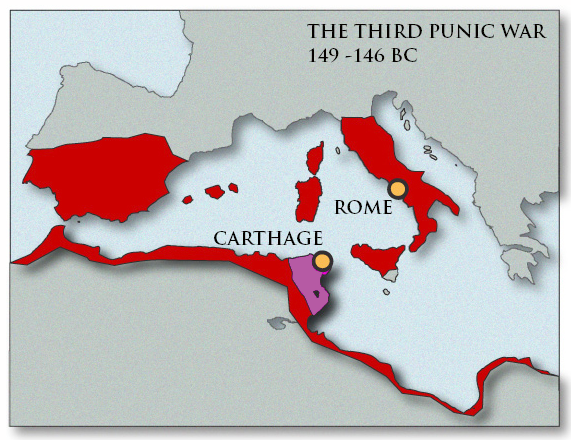
In the years intervening, Rome undertook the conquest of the Hellenistic empires to the east. In the west, Rome brutally subjugated the Iberian people who had been so vital to Roman success in the second Punic War. However, they were especially angry at the Carthaginians who had almost destroyed them. The great statesman of Rome, Cato, is reported by the historians as ending all his speeches, no matter what their subject, with the statement, "I also think that Carthage should be destroyed." Carthage had, through the first half of the second century BC, recovered much of its prosperity through its commercial activities, although it had not gained back much power. The Romans, deeply suspicious of a reviving Carthage, demanded that the Carthaginians abandon their city and move inland into North Africa. The Carthaginians, who were a commercial people that depended on sea trade, refused. The Roman Senate declared war, and Rome attacked the city itself. After a seige, the Romans stormed the town and the army went from house to house slaughtering the inhabitants in what is perhaps the greatest systematic execution of non-combatants before World War II. Carthaginians who weren't killed were sold into slavery. The harbor and the city was demolished, and all the surrounding countryside was sown with salt in order to render it uninhabitable.
THE illyrian WARS
Origins of the Conflict
First Illyrian War Even before the war with Carthage 264-241 BC, the Romans had been aware of the danger to the Adriatic coast of Italy from seaborne attack. In 246 BC, a colony of Roman citizens was settled at Brundisium to keep a watch on the Ionian gul.f.
The Second Illyrian War lasted from 220 BC to 219 BC.
In 219 BC, the Roman Republic was at war with the Celts of Cisalpine Gaul, and the Second Punic War with Carthage[7] was beginning. These distractions gave Demetrius the time he needed to build a new Illyrian war fleet. Leading this fleet of 90 ships, Demetrius sailed south of Lissus, violating his earlier treaty and starting the war
The Third Illyrian War lasted from 169 BC to 168 BC.
In 171 BC, the Illyrian king Gentius was allied with the Romans against the Macedonians. But, in 169 BC, he changed sides and allied himself with Perseus of Macedon. During the Third Illyrian War, in 168 BC, he arrested two Roman legati and destroyed the cities of Apollonia and Dyrrhachium, which were allied to Rome. He was defeated at Scodra by a Roman force under L. Anicius Gallus,[14] and in 167 brought to Rome as a captive to participate in Gallus' triumph, after which he was interned at Iguvium.
First Macedonian War (214 to 205 BC)
Second Macedonian war (200 to 196 BC)
Third Macedonian War (172 to 168 BC)
Fourth Macedonian War (150 to 148 BC)
Were a series of conflicts fought by the Roman Republic and its Greek allies in the eastern Mediterranean against several different major Greek kingdoms. They resulted in Roman control or influence over the eastern Mediterranean basin, in addition to their hegemony in the western Mediterranean after the Punic wars. Traditionally, the "Macedonian Wars" include the four wars with Macedonia, in addition to one war with the Seleucid Empire, and a final minor war with the Achaean League (which is often considered to be the final stage of the final Macedonian war). The most significant war was that fought with the Seleucid Empire, while the war with Macedonia was the second, and both of these wars effectively marked the end of these empires as major world powers was a military conflict between two coalitions led by the Roman Republic and the Seleucid Empire The fighting took place in Greece, the Aegean Sea and Asia Minor. The fighting ended with a clear victory of the Romans. In the Treaty of Apamea the Seleucids were forced to give up Asia Minor, which fell to Roman allies. As a main result of the war the Roman Republic gained the hegemony over Greece and became the only remaining major power around the Mediterranean Sea.
Expansion of Rome in 2nd century BC
▪ 229 BC : Adriatic Control : First Illyrian War begins.
▪ 227 BC: Queen Teuta surrenders : First Illyrian War ends
▪ 224 BC : Rome defeats Gaul invasion : Battle of Telamon
▪ 223 BC : Rome defeats Gauls : Cisalpine Gaul
▪ 220 BC : Adriatic Control : Second Illyrian War begins.
▪ 219 BC : Demetrius defeated : Second Illyrian War ends.
▪ 214/205 BC : Stalemate : First Macedonian War
▪ 213/211 BC : Rome captures Syracuse : Siege of Syracuse
▪ 202/196 BC : Philip V of Macedon defeated : Second Macedonian War
2nd century BC
▪ 197 BC : Hispania Ulterior and Hispania Tarraconensis become Roman provinces
▪ 192/189 BC : Mediterranean Dominance : Roman–Syrian War
▪ 172/167 BC : Macedon divided into 4 client republics : Third Macedonian War
▪ 154/138 BC : Roman conquest south of Lusitania : Lusitanian War
▪ 149/148 BC : Conquest of Macedonia : Fourth Macedonian War
▪ 146 BC : Conquest of Greece, incorporated into Macedonia, Corinth destroyed
▪ 146 BC : Annexation : Macedonia and Africa : provinces
▪ 121 BC : Conquest of Gallia Transalpina (Narbonensis)
▪ 129 BC : Inheritance of the kingdom of Pergamum (Province of Asia)
Safe land route to Hispania
▪ 112 BC : Jughurta of Numidia attacks in Numidia : Jugurthine War Starts
▪ Jughurta captured : Jugurthine War ends
▪ Cimbri tribes inflict a major defeat on the Roman army : Battle of Arausio
▪ 102 BC : Battle of Aquae Sextiae
▪ 101 BC :Battle of Vercellae Cisalpine Gaul

